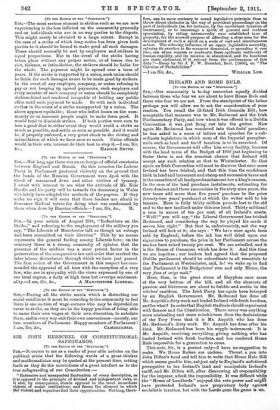[To THE EDITOR OF THE "SPECTATOR. "]
SIR,—The most serious element in strikes such as we are now experiencing is the loss inflicted on the community generally and on individuals who are in no way parties to the dispute. This might surely be obviated to a large extent. Except in the case of a strike of which long notice has been given both parties to it should be bound to make good all such damages. These should normally be met by employers and strikers in equal proportions. But in the event of the strike having taken place without any proper notice, or of losses due to riot, violence, or intimidation, the strikers should be liable for the whole. The payment might be spread over a term of years. If the strike is supported by a union, such union should be liable for such damages as are to be made good by strikers. In the event of any employer, company, or union refusing to pay or not keeping up agreed payments, such employer and every member of such company or union should be completely disfranchised and rendered incapable of holding any public office until such payment be made. So with each individual strikes' in the event of a strike unsupported by a union. The above appears equitable ; those who inflict losses on the com- munity or on innocent people ought to make them good. It would tend to diminish strikes. If both parties were sure to lose a good deal in either event they would avoid a strike as much as possible, and settle as soon as possible. And it would be, if properly enforced, a very great check to the rioting and intimidation of which we have seen so much. Union officials would in their own interest do their best to stop it. —I am, Sir,






































 Previous page
Previous page